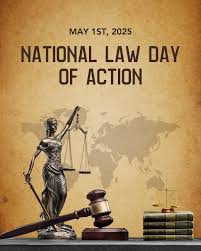By Neal Lemery
While May has a strong tradition in American life of celebrating workers and advocating for the organized labor movement, the day is also celebrated to honor the rule of law in American society. May 1 is Law Day.
Respect for the rule of law has always been a foundation of American society. Indigenous tribes have a strong history of rules, customs, and legal processes for decision-making and dispute resolution. European settlers began their colonizations with formal legal structures. The Mayflower Compact was crafted on the Mayflower before settlers came ashore. Early colonies had royal charters, elected councils and legal codes, ensuring an orderly social contract and governing processes. The American Revolution began as a protest over British tariffs on tea.
On the Oregon Trail, wagon trains had written rules, and the first white Oregon government was formed to organize a collective response to wolves preying on livestock. The “Wolf Meeting” in 1843 created an elected government before Oregon became a federal territory, with elected judges, governor, and governing council.
Today, we take a formalized legal structure of dispute resolution and governance for granted, routinely electing officials, convening legislatures and courts, and practicing democratic governance in every aspect of civic life. We often have vigorous debate on every possible issue of public life, yet within those discussions, we rely on the framework of American justice and law making.
We tend to take this framework, this sometimes complex process of debate and decision making, for granted. Yet, we rely on the “consent of the governed” and the concepts of our social compact with each other to live in an organized civil society framed by our collective belief in individual rights, due process, and everyone being equal under the law.
When I served as a traffic court judge, a young man appearing on a seat belt ticket told me he thought the law was stupid and he was refusing to buckle up. I asked him when he drove to court that morning what side of the road he drove on. He seemed puzzled by my question and then replied “the right side, of course.”
“Why did you do that, why did you follow that law?”
“Well, it would be chaos if I didn’t,” he said. “Everyone needs to follow the law.”
We live in a society where we can energetically debate what the law should be, and how the law can be changed to make for a better way of living together. We agree to drive on the road in the same way, to avoid chaos, and because we have agreed to be law-abiding.
One of the strengths of a democracy and a republic is our ability to seriously debate an issue, to bring a wide range of ideas and viewpoints to the table, and to improve the law to meet the needs of a changing society, advancing the common good while protecting individual rights and freedoms. We can be wrong, we can be different, and we can agree to disagree. Yet, our common goal remains to live together and advance the common good. As the writers of our federal constitution wrote:
“We the People of the United States, in Order to form a more perfect Union, establish Justice, insure domestic Tranquility, provide for the common defense, promote the general Welfare, and secure the Blessings of Liberty to ourselves and our Posterity, do ordain and establish this Constitution of the United States of America.”


